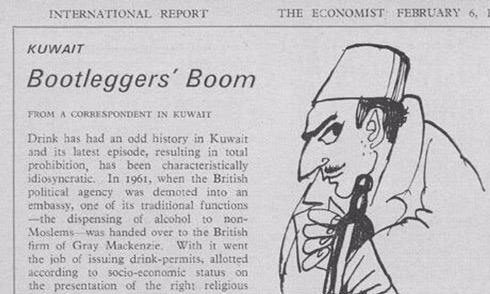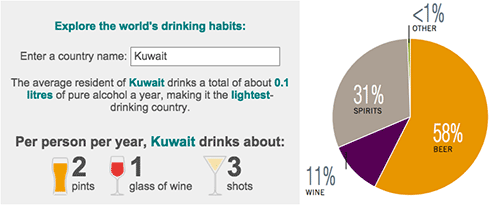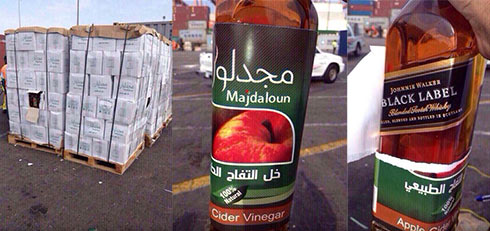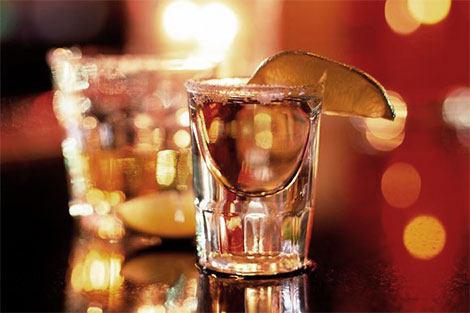
A redditor shared a scan from an article in The Economist dating back to 1965 on the alcohol prohibition in Kuwait. I typed out the article since the scan wasn’t clear and have decided to share it below:
———————————————————–
International Report – The Economist – February 6, 1965
Kuwait
Bootleggers’ Boom
From a correspondent in Kuwait
Drink has had an odd history in Kuwait and its latest episode, resulting in total prohibition, has been characteristically idiosyncratic. In 1961, when the British political agency was demoted into an embassy, one of its traditional functions – the dispensing of alcohol to non-Moslems – was handed over to the British firm of Gray Mackenzie. With it went the job of issuing drink-permits, allotted according to socio-economic status on the presentation of the right religious credentials.
This neat division of the population, into Kuwaitis who did not drink and foreigners who did, was obviously too pastoral to last. Kuwaitis grew rich, travelled abroad, and learnt forbidden tastes. Since alcohol, like water, finds its own level, it tended to leak across the religious barrier to the richer Kuwaitis. Poorly paid Indian and Lebanese clerks could easily be induced to hand over their ration to Kuwaitis with money. Smuggling from neighboring countries (Iraq produces both beer and arak) was no difficult and made up for any short-fall in the supply. With good whiskey at £1 a bottle, Kuwait was a drinker’s paradise; the fall was sudden and uncomfortable.
In November the Mejlis passed an amendment to the penal code under which sentences of up to 10 years’ imprisonment can be imposed for the import, manufacture or sale of alcohol. Existing stocks may be discreetly consumed (an earlier proposal would have banned this too) but there will be no more. Two conflicting passions converged to bring this amendment about: moral indignation and commercial jealousy. People now find it hard to remember which came first.
The mortal indignation was understandable though, as is often the case, naive about the value of prohibition as a solution. Drink had become a social problem. Alcoholism among Kuwaitis was growing; accidents from drunken driving were increasing and, worst of all, drink was reaching the young. A decision-making scandal (suppressed at the time) was a case of drunkenness in a secondary school.
Meanwhile the fact that drink had grown into a business worth £500,000 – rumor put it even higher – had not escaped the attention of Kuwait merchants who began to agitate against Gray Mackenzie’s monopoly. Their resentment was rational in a free economy, but they overlooked the fact that Gray Mackenzie handled drink precisely because Moslems were not supposed to.
Horrified at the thought of drink being sold freely at every street corner, the moralists acted. A Moslems revivalist group called the League of Social Reform organized a monster petition. Sermons were preached in all the mosques. Pressure was brought upon the members of the Mejlis. Caught in the coils of its own morality, Kuwait’s establishment was helpless. Known drinkers were the most zealous to pay their tribute to virtue, and the crowning irony was when, in the final open session, the only deputy to vote against the amendment was teetotaller.
Prohibition could certainly never have happened without parliament. But Kuwait is now a mercantile democracy and the voice of both souk and mosque is stronger in the two-year-old Mejlis than they would have been in the ruler’s antechamber, where the urbane tones of oil company representatives carry more weight. The government is now committed to carry out prohibition but no one feels that its heart is in it.
It will take some time before stocks are exhausted, though whiskey has already gone up to about £15 a bottle – and is still rising. But the effect on clubs and social life is lethal, and Kuwaitis who employ foreigners are afraid that they will now have to dangle even juicier carrots. The economic consequences of boredom are impossible to assess, but one of Kuwait’s main problems is to keep its population at home and grow roots. Prohibition will probably do nothing to help.
A weightier argument against prohibition is that its social problems are likely to prove worse than those of drink. Already 30 people have died from methyl alcohol poisoning and another 55 are in hospital. Ea de cologne, cough syrups and surgical spirit have gained a new, sinister importance. The weekend traffic on the Basrah road has quadrupled. Smuggling, racketeering, corruption, substitute addictions are other unpleasant consequences which a paternalistic and progressive government cannot ignore.








